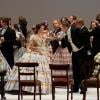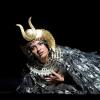
Stanislavski’s famous dictum — “there are no small roles, only small actors” — was well demonstrated at the Sunday, Sept. 25 premiere of San Francisco Opera’s production of Tchaikovsky’s Eugene Onegin.
A “secondary character” she may be, with the limited stage time of a scene and a half, but Olga, sister of the constantly present heroine Tatyana, was nevertheless a welcome breath of fresh air — or rather, a hurricane — with her big, powerfully projected voice and appealing stage presence in the curiously understated, static first act.
Mezzo-soprano Aigul Akhmenshina, in her West Coast debut, made a big impression in a small role. She is from the capital city of Ufa in the Russian republic of Bashkortostan, a town that is also the birthplace of bass Ildar Abdrazakov.
The production’s Tatyana, Evgenia Muraveva in her SF Opera debut, is also from Russia (as was Tchaikovsky, of course), so there was a pro-Ukrainian demonstration at the main entrance of the War Memorial on Sunday; more about the “Russian question” further below.

Muraveva and Canadian bass-baritone Gordon Bintner (Onegin) both shone in their big moments, the soprano in an affecting Letter Scene, Bintner in his futile attempt at the opera’s end to reverse his rejection of Tatyana now that she is a princess. In the role of Vladimir Lensky (this reviewer noticed the character’s first name after 50 years of missing it), the young tenor Evan LeRoy Johnson filled the cavernous War Memorial with a gorgeous, well-focused, lyrical voice.
There was also a special appearance in the one-aria “small role” of Prince Gremin: Ferruccio Furlanetto, whose 43-year-long participation in the company — ranging from roles in Così fan tutte to Attila — was acknowledged with the San Francisco Opera Medal.
Led by the debuting Greek conductor Vassilis Christopoulos, the SF Opera Orchestra performed smoothly, with only a few instances of being ahead or behind the singers. The strings did their best approximation of a “Russian sound”; Gabriel Young performed an affecting oboe obbligato in the Letter Scene; the brass came to life for the dances.

What the conductor failed to evoke consistently was the awe of the score as described in Larry Rothe’s program article: “No one can accuse Onegin of lacking grandeur, which infuses even the first-act peasants’ chorus and dance, the second-act waltz and mazurka, the third-act polonaise. In them and throughout, we hear signature Tchaikovsky, the Tchaikovsky who wrings every ounce of color and weight from a standard orchestral complement.”
The Opera Chorus not only sang well — as usual — but changed costumes and miens rapidly, from peasants to country nobility to courtiers.
About the production: Robert Carsen, an old hand in the War Memorial and much acclaimed around the world, did something pointless here. With Michael Levine’s beyond-minimalist set design, rescued by Christine Binder’s lighting and Levine’s own good costume design, Carsen did nothing to serve the work.

The set consists of three gigantic PVC panels that cover most of the full dimensions of the War Memorial stage. Until the crowd scenes of Act 2, the stage remains mostly bare. One additional presence in Act 1 is 40 bushels’ worth of painted polyester pieces representing birch leaves from some symbolic trees that occasionally appear as part of the scrim. How this carpet of birch substitutes cover the floor of Tatyana’s supposedly indoor bedroom is a mystery, but that doesn’t prevent Carsen from making the heroine roll passionately in polyester.
Most unfortunate is Carsen’s demolishing of the fourth wall to show a costume change in front of the stage, interrupting a crucial moment in the story. What Tchaikovsky did after Onegin kills Lensky in a duel is to bring down the curtain, pause for the audience to catch its breath, and use the polonaise to bridge the jump in time to years later, when Tatyana is married to a prince.
What Carsen does is none of that. There’s no curtain after the fatal shot. Onegin comes downstage to be changed into evening wear by a group of servants, and Lensky’s corpse is carried out. The polonaise is played (well) by the orchestra, but there are no dancers, and instead of years, just minutes go by. This is not regieoper; it’s opera-cide by director.

Finally, the politics of the event. In the seven months since Vladimir Putin’s invasion of Ukraine, producing a Russian opera with Russian singers now leads not only to a demonstration in front of the War Memorial but also to questions in the minds of many. Kudos to SF Opera for dealing with the issue up front in a fact-based, thoughtful program article, which includes this historical reference:
“Tchaikovsky ... traced [his] lineage to proto-Ukrainian Cossack warriors who had, for centuries, battled against Russian and other empires seeking to dominate the territory of Ukraine. Tchaikovsky is the Russified surname of a family that had, over generations, assimilated into the Russian imperial elite — the family’s original surname was ‘Chaika’ (meaning ‘seagull’).”
Fellow Holocaust survivors will well remember passionate controversies about musicians associated with the Third Reich or who just didn’t actively resist the regime, and there is a still-existing ban on Richard Wagner’s music in Israel, unofficial but effective. Denazification and dealing with individual cases took years, however, and judgements about Putin’s collaborators, such as Valery Gergiev, or those not now opposing the invasion of Ukraine are instant, all-pervasive on social media, and inevitably, sometimes not fact-based.
SF Opera’s handling of the situation is a small measure of “progress” in the midst of another man-made tragedy.
Correction: The article, as originally published, listed an incorrect role that Ferruccio Furlanetto hadn’t played in his time at San Francisco Opera




